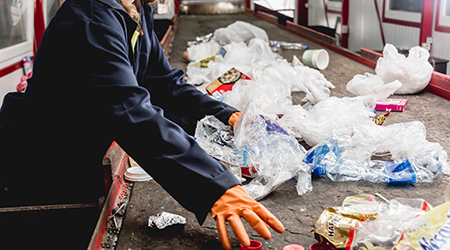WHEN people say to us that they want their packaging to be more eco-friendly, that can mean many things: they may want to replace plastic with paper; they may want recyclable plastics, they may just want to reduce the amount of plastic used.
Two things are often overlooked when considering flexible packaging – the inks and the adhesives. And they should be part of the sustainability conversation.
Even if you can’t move away from plastics, or reduce the amount of plastic used, it is possible to do your bit by using water-based inks and adhesives.
Water-based inks and solvent-based inks are the two types of inks that are used in the printing industry for flexible packaging. The overwhelming majority of flexible packaging printers globally still use solvent-based inks.
A few years ago Sirane decided to aim to exclusively use water-based inks for its flexographic print process. We now use these inks for all our substrates, including our coated papers (Earthfilm), traditional plastics and ovenable structures.
Water-based inks have many advantages, which is why we have chosen to use them. Here are some of the benefits of water-based inks compared with solvent-based.
- Eco-friendliness: Water-based inks are considered more environmentally friendly than solvent-based inks. This is because they do not emit volatile organic compounds (VOCs) during the printing process, which can be harmful to the environment and contribute to air pollution.
- Health and safety: Solvent-based inks can be harmful to inhale, as they release VOCs into the air. Water-based inks, on the other hand, are much safer to use, as they do not release harmful fumes into the air. This makes them a better choice for printing facilities, where workers are often in close proximity to these inks.
- Print quality: Our water-based inks are part of what makes our Amethyst Print Technology special, and we can produce high-quality print with good colour fidelity and sharp details. They can also be used to print on a wide range of packaging materials, including paper substrates and traditional plastics.
- Ink Waste. Our water-based inks are so clean that waste can be discarded using existing drainage systems.
We simply don’t need a thermal oxidiser – or any other equipment – to deal with harmful Volatile Organic Compounds which you would typically find in any flexible packaging facility.
Overall, our water-based inks offer a number of benefits, including eco-friendliness, health and safety and fantastic print quality.
A lot of substrates also use adhesives as part of the production process. Again, for environmental reasons, Sirane uses water-based adhesives only.
Typical adhesives used in the flexible packaging industry contain aromatic isocyanates which release aromatic amines, these include compounds classified as potential human carcinogens and known to cause cancer in animals.
To conform to the legislation, laminates have to cure in a warm environment to reduce the amount of these harmful substances that can migrate into the product. Other unwanted substances found in packaging adhesives are: Bisphenol A Diglycidyl Ether (BADGE), Bisphenol F Diglycidyl Ether (BFDGE), or Novolac Glycidyl Ether (NOGE).
Our water-based adhesives do not contain these harmful ingredients that can migrate into the product! There are also energy savings, due to the reduced curing time.
So, if you’re having conversations about the sustainability of your flexible packaging, make sure that the inks and adhesives are part of that conversation!
PETER RALTEN



